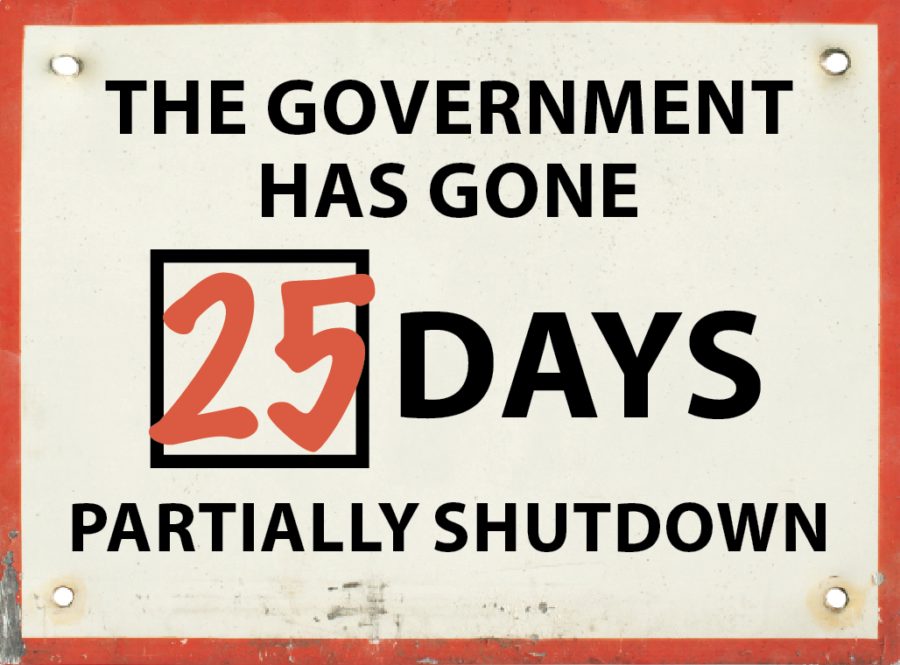Government shutdown could cause problems for students and universities
By Alex Connor, [email protected] @thealexconnor
Shutdown graphic
January 14, 2019
Federal workers aren’t the only ones at risk during the government shutdown. Public institutions such as Iowa State may also face repercussions regarding aid and grant funding, which could result in negative consequences for students.
When explaining how the student aid process works, Julia Sullivan, the assistant director in the Office of Student Financial Aid said students filing for federal Free Application for Federal Student Aid may experience problems.
“When you file your FAFSA, there are matches that are done to different organizations in the government,” Sullivan said.
Because some of the organizations that give verification documents are closed down, fears were initially high about the possibility that students would be unable to apply for FAFSA for the 2019-20 academic year.
Before Wednesday, some materials couldn’t be obtained due to the closure of the IRS. The system is now mostly operational and students can access their tax records. The only major issue remaining with the FAFSA review process is the inability to verify that a male student has registered with the Selective Service.
Although students may not be negatively effected during the shutdown, the university is a different story.
The National Science Foundation will likely suspend reviews of grant proposals, meaning Iowa State could miss out on requested grants, and funding could dry up for many research groups on campus.
Iowa State President Wendy Wintersteen said the impact at Iowa State will be incremental. Some organizations will not be affected immediately while others have already experienced problems.
The Ames Lab has already received its funding from the Department of Energy, so it will be able to operate for the foreseeable future. Other projects like Science-based Trials of Rowcrops Integrated with Prairie Strips (STRIPS), a program dedicated to farmland and prairie conservation, may not be as lucky.
“If the FSA [Farm Service Agency] stop work order persists much past February or if the USDA budget allocations are altered, funding will become a problem,” said Omar de Kok-Mercado, the project coordinator.
A prolonged government shutdown could halt all activity for the group.
Wintersteen is concerned about what will happen if the current situation isn’t resolved soon.
“All of this will snowball,” Wintersteen said. “Will we be able to have grants reviewed? Will grants be able to be rewarded in a timely fashion? The research enterprise at Iowa State is a big part of what we do and how we excel, and if grant funding from the federal government gets delayed then that will have a significant impact at Iowa State.”
Shutdowns happen because the U.S. Constitution mandates that all federal spending be authorized by Congress with the approval of the president. If the two branches of government cannot agree to pass the necessary expenditures, some parts of the federal government may temporarily close due to lack of funding.
This occurrence has only happened 20 times in American history, with the current shutdown being No. 21. None had taken place until 1976 when President Gerald Ford vetoed a $56 billion spending bill.
Since then, presidents from both parties have been in office during shutdowns. Most only lasted for three to 10 days but a few lasted several weeks. On Jan. 12, the record for the longest shutdown was broken when the government found itself in its 22nd day of partial inactivity.
Generally, only nonessential parts of the government are shut down. “Nonessential” doesn’t mean that an agency is not important, it simply indicates that it isn’t vital for security or stability. The military never stops operations because it is required for national defense. The most impact is felt on interior programs and services.
This means departments like the National Park Service, Federal Communications Commission, Environmental Protection Agency and IRS greatly reduce or stop their services. Close to 800,000 workers have been sent home without pay. One paycheck has already been missed for government workers, and the deadline for a second is on its way. Some workers for the IRS have been brought back to file tax returns but won’t be paid until after the shutdown is lifted.







